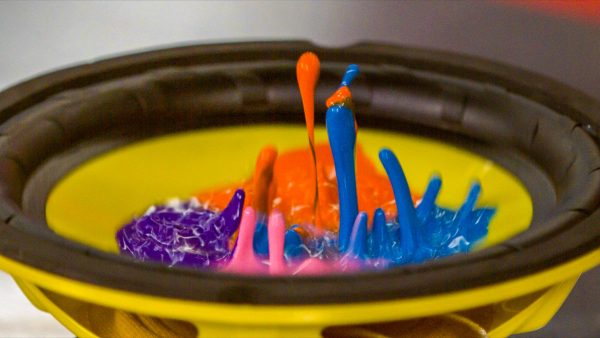Hearing Definition
Hearing is using our ears to listen to sound. For example, hearing music.
View Lesson on Introduction to Sound
Become a member to get full access to our entire library of learning videos, reading material, quiz games, simple DIY activities & more.
Become a member to get full access to our entire library of learning videos, quiz games, & more.
Plans & Pricingto watch this full video.

Access All Videos
and Lessons, No Limits.
Access All Videos

No credit card required,
takes 7 sec to signup.
No card required

Ready-to-go lessons
that save you time.
Ready-to-go lessons
If you are on a school computer or network, ask your tech person to whitelist these URLs:
*.wistia.com, fast.wistia.com, fast.wistia.net, embedwistia-a.akamaihd.net
Sometimes a simple refresh solves this issue. If you need further help, contact us.
Introduction to Sound
Fun Facts
- Vibrations are what let us hear each other speak.
- When air is blown through a clarinet or saxophone, the reed produces vibrations you can hear.
- We hear sound with our sense of hearing, which is made possible by our ears.
Why Do We Need To Know About Hearing
Learning about how we hear is important for jobs in teaching, giving advice, and talking with others. Knowing that vibrations from sounds let us hear what someone is saying is important in these jobs.
This knowledge is also key in music, making and fixing audio equipment, and in science projects that use sound. For example, when you know that thicker strings on a guitar vibrate slower and make a different sound, you see how hearing affects making music.
Frequently Asked Questions
Check out the Full Lesson on Introduction to Sound
In this lesson, we learn that:
- We'll discover that when things vibrate they make sound.
- That sound can also make things vibrate.
- Vibrations are what let us hear each other speak.
Related Topics
- Balanced Force Definition
- Biosphere Definition
- Carbon Dioxide Definition
- Cast Fossils Definition
- Cell Definition
- Chemical Change Definition
- Chemical Reaction Definition
- Collision Definition
- Condensation Definition
- Conduction Definition
- Decomposer Definition
- Definition Of Engineering
- Definition Of Experiment
- Definition Of Living Things
- Earth’s Orbit Definition
- Electric Field Definition
- Engineering Design Process Definition
- Generator Definition
- Geologic Processes Definition
- Hearing Definition
- Hydrosphere Definition
- Latitude Definition
- Light Definition
- Liquid Definition
- Moon Definition
- Ocean Current Definition
- Opaque Definition
- Orbit Definition
- Pattern Definition
- Pendulum Definition
- Pollinator Definition
- Pollution Definition
- Reversible Change Definition
- Rock Definition
- Seed Definition
- Smelling Definition
- Sound Definition
- Species Definition
- Sunlight Definition
- Symbiosis Definition
- Thermal Energy Definition
- Vibrating Definition
- Volts Definition
- Water Definition
- Weathering Definition
- Wedge Definition
- Weight Definition
- Wind Erosion Definition
Start a Free Trial Today. Get a $5 Amazon Gift Card!
Teachers! Start a free trial & we'll send your gift card within 1 day. Only cards left. Try it now.
Select Grade
Select Subject
This email is associated with a Science Kit subscription. Kit subscriptions are managed on this separate page: Manage Subscription

-
Download InvoiceScience & Math$/yr
-
Download InvoiceScience Only$/yr

access all lessons
• No credit card required •
"My students loved the videos. I started the video subscription in May and used them as a review before the state test, which I know contributed to 100% of my class passing the state test."
Rhonda Fox 4th Grade Teacher, Ocala, Florida
• No credit card required •
"My students loved the videos. I started the video subscription in May and used them as a review before the state test, which I know contributed to 100% of my class passing the state test."
Rhonda Fox 4th Grade Teacher, Ocala, Florida
• No credit card required •
Already a member? Sign In
* no credit card required *

* no credit card required *
* no credit card required *


no credit card required
Skip, I will use a 3 day free trial
Enjoy your free 30 days trial
-
Unlimited access to our full library
of videos & lessons for grades K-5. -
You won’t be billed unless you keep your
account open past your 14-day free trial. -
You can cancel anytime in 1 click on the
manage account page or by emailing us.
-
Unlimited access to our full library of videos & lessons for grades K-5.
-
You won't be billed unless you keep your account open past 14 days.
-
You can cancel anytime in 1-click on the manage account page.
Cancel anytime in 1-click on the manage account page before the trial ends and you won't be charged.
Otherwise you will pay just $10 CAD/month for the service as long as your account is open.
Cancel anytime on the manage account page in 1-click and you won't be charged.
Otherwise you will pay $10 CAD/month for the service as long as your account is open.
We just sent you a confirmation email. Enjoy!
DoneWe use cookies to make your experience with this site better. By using this site you agree to our use of cookies. Click "Decline" to delete and block any non-essential cookies for this site on this specific property, device, and browser. Please read our privacy policy for more information on the cookies we use.Learn More
We use cookies to improve your experience. By using this site, you agree to our use of cookies. Click "Decline" to block non-essential cookies. See our privacy policy for details.Learn More




























































































































